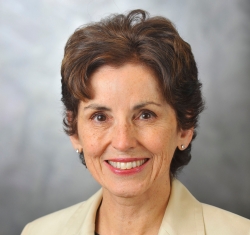France A. Córdova was sworn in as the 14th director of the National Science Foundation (NSF) on 31 March 2014. President Obama nominated her to the six-year term in August 2013 and the U.S. Senate confirmed her nomination on 12 March 2014. She succeeds Subra Suresh, who stepped down in March 2013. Cora B. Marrett was acting director at NSF during the interim.

Córdova is president emerita of Purdue University, where she served from 2007 to 2012. From 2002 to 2007, she led the University of California at Riverside as chancellor and was a distinguished professor of physics and astronomy. Previously, Córdova was the vice chancellor for research and a professor of physics at the University of California at Santa Barbara from 1996 to 2002, and head of the astronomy and astrophysics department at the University of Pennsylvania from 1989 to 1993. She was NASA's chief scientist from 1993 to 1996 and on staff at Los Alamos National Laboratory from 1979 to 1989, the last two years as deputy group leader in the Earth and Space Science Division.
Most recently, Córdova served as chair of the Board of Regents of the Smithsonian Institution and as a member of the National Science Board, where she chaired the Committee on Strategy and Budget. She received a Bachelor of Arts degree from Stanford University and a PhD from the California Institute of Technology.
Córdova met with the NSF Advisory Committee for the Geosciences during the spring meeting held 3-4 April 2014. According to a recent report in EOS , Advisory Committee members addressed several issues including concerns regarding the progress of the reintegration of the Polar Program into the Directorate of Geosciences (GEO). A specific concern mentioned was the quick succession in NSF leadership since the merger of Polar Programs with GEO and related uncertainty about how that may affect the polar research community. Director Córdova stated that the agency would take a close look at the merger to ensure it is the right approach. She noted that NSF has to be prepared to meet the broader concerns related to stewardship in the polar regions, that the hope is incorporating polar programs in GEO will benefit those programs, and that the agency will be flexible should it be necessary to go a different direction.
NSF's annual budget is about $7.2 billion. The agency's budget request for FY15 is $7.3 billion, an increase of 1 % over the 2014 enacted level. NSF's annual budget represents 24% of the total federal budget for basic research conducted at U.S. colleges and universities, and this share increases to 60% when medical research supported by the National Institutes of Health is excluded. In many fields, NSF is the primary source of federal academic support.
For further information, and to read source material for this article, please see: https://www.nsf.gov/news/news_summ.jsp?cntn_id=130931 and
http://cen.acs.org/articles/91/i31/Astrophysicist-Tapped-New-NSF-Direct….
